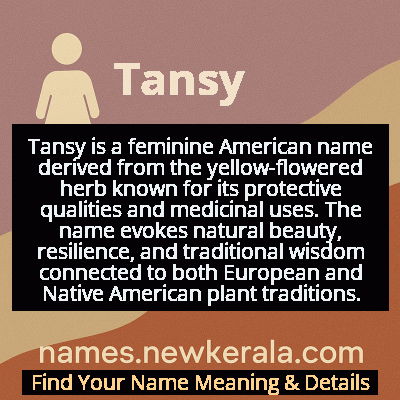Tansy Name Meaning & Details
Origin, Popularity, Numerology Analysis & Name Meaning of Tansy
Discover the origin, meaning, and cultural significance of the name TANSY. Delve into its historical roots and explore the lasting impact it has had on communities and traditions.
Name
Tansy
Gender
Female
Origin
American
Lucky Number
7
Meaning of the Name - Tansy
Tansy is a feminine American name derived from the yellow-flowered herb known for its protective qualities and medicinal uses. The name evokes natural beauty, resilience, and traditional wisdom connected to both European and Native American plant traditions.
Tansy - Complete Numerology Analysis
Your Numerology Number
Based on Pythagorean Numerology System
Ruling Planet
Neptune (Ketu)
Positive Nature
Intuitive, analytical, spiritual, and inquisitive.
Negative Traits
Secretive, reserved, aloof, and can be overly critical.
Lucky Colours
Green, yellow.
Lucky Days
Monday.
Lucky Stones
Cat’s eye, moonstone.
Harmony Numbers
1, 5, 6.
Best Suited Professions
Scientists, researchers, spiritual leaders, detectives.
What People Like About You
Depth of knowledge, analytical skills, spirituality.
Famous People Named Tansy
Tansy E. Hoskins
Journalist/Author
British journalist and author known for her critical works on fashion industry ethics and labor practices
Tansy Davies
Composer
British composer recognized for innovative contemporary classical works performed by major orchestras worldwide
Tansy May
Botanist
American botanist who specialized in medicinal plants and contributed to herbal medicine research
Name Variations & International Equivalents
Click on blue names to explore their detailed meanings. Gray names with will be available soon.
Cultural & Historical Significance
In Native American contexts, particularly among Hopi and other Southwestern tribes, plants similar to tansy were incorporated into traditional healing practices and ceremonial uses. The bright yellow flowers held solar symbolism and were connected to life-giving forces. The plant's resilience in harsh environments made it a symbol of endurance and adaptation. In more recent history, tansy became part of the complex Victorian language of flowers, where it carried the surprising message of declaration of war or resistance, making it a powerful symbolic choice in floral communications. This multifaceted cultural history gives the name Tansy rich layers of meaning that connect ancient traditions with contemporary values.
Extended Personality Analysis
Women named Tansy often exhibit a distinctive blend of strength and sensitivity that reflects their botanical namesake. They typically possess natural leadership qualities combined with a deep connection to nature and tradition. Tansys are known for their resilience and ability to adapt to challenging circumstances while maintaining their core principles and values. Their independent nature is balanced by strong protective instincts toward family and community, making them both self-reliant and deeply loyal. The vibrant yellow flowers of the tansy plant mirror the cheerful, optimistic disposition often found in those who bear this name, while the plant's strong scent and protective qualities translate to a personality that is both memorable and steadfast.
Intellectually curious and naturally observant, Tansys tend to be quick learners with a particular affinity for understanding complex systems and natural patterns. They often demonstrate creative problem-solving skills and innovative thinking, drawing inspiration from both traditional wisdom and contemporary ideas. While they can be determined and occasionally stubborn in pursuing their goals, this persistence is typically tempered by practical wisdom and emotional intelligence. Their combination of strength, intelligence, and natural warmth makes Tansys compelling individuals who leave lasting impressions on those they encounter, much like the distinctive presence of their namesake plant in any garden or landscape.
Modern Usage & Popularity
In contemporary naming practices, Tansy has emerged as a distinctive choice within the growing category of botanical and nature-inspired names. While it remains relatively uncommon compared to more popular floral names like Lily or Rose, it has seen increased usage in recent decades, particularly among parents seeking unique yet meaningful names with natural connections. The name enjoys moderate popularity in English-speaking countries, especially the United States, United Kingdom, and Australia, where it fits well with current trends favoring vintage revivals and ecological awareness. Its rarity ensures that children named Tansy are unlikely to share their name with multiple classmates, while its straightforward pronunciation and spelling make it accessible across different cultural contexts. The name's association with strength, protection, and natural beauty appeals to modern parents who value these qualities and seek names that convey both individuality and timeless appeal.
Symbolic & Spiritual Meanings
The symbolic meanings of Tansy are deeply rooted in the characteristics and historical uses of the plant itself. Most prominently, it symbolizes protection and warding off negative influences, derived from the plant's traditional use as a natural insect repellent and its placement in homes to deter pests and evil spirits. This protective quality extends metaphorically to emotional and spiritual safeguarding, making Tansy a symbol of resilience and boundaries. The plant's use in preserving meat and its association with funeral rites also connects it to concepts of immortality and the enduring nature of the soul. The bright, cheerful yellow flowers represent vitality, happiness, and the life-giving power of the sun, while the plant's ability to thrive in challenging conditions symbolizes adaptability and strength. In the Victorian language of flowers, Tansy's declaration of 'war' adds layers of courage, conviction, and the willingness to stand up for one's beliefs, creating a complex symbolic profile that balances gentle beauty with formidable strength.

